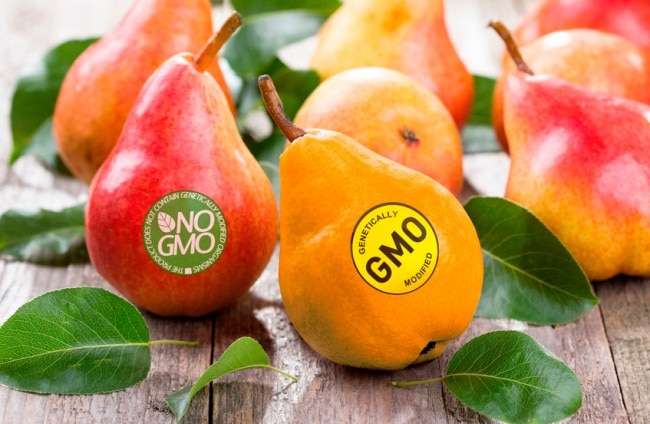With a few strokes of his pen, President Obama angered anti-GMO advocates on July 29. That’s when Obama signed into law a U.S. Senate bill that includes what critics call the Denying Americans the Right to Know (DARK) Act.
As characterized by opponents, the DARK Act blocks states’ GMO labeling laws, such as first-of-its-kind legislation in Vermont, and — more broadly — makes it easier for food manufacturers to hide whether their products contain GMOs. Andy Kimbrell, executive director of the nonprofit Center for Food Safety, calls the new federal law “a sham and a shame.”
The DARK Act gives the U.S. Department of Agriculture two years to write GMO standards — standards that the Just Label It campaign complains will be devoid of simple on-the-package disclosures.
In the meantime, another food fight is brewing at the national level.
In May, the U.S. Food and Drug Administration (FDA) closed its public-comment window regarding calls to clarify or even ban “natural” food labeling. From last November through this May, the agency received thousands of comments on the issue. At this point, it’s not clear when — or whether — the FDA will weigh in on “natural” labeling.
Consumer confusion
What is clear is that confusion reigns about the definition of “natural” as it applies to food labels. For instance, a nationwide survey taken in 2014 by Consumer Reports magazine showed that 64 percent of Americans mistakenly equate “natural” with food containing no GMOs.
Consumers Union, the advocacy arm of Consumer Reports, says that the meaning of the word “natural” on food labels is fuzzy and that the term lacks regulation by the FDA or any other government agency.
For millions of American consumers, the meaning of “natural” is critical when they’re shopping for food. A survey released earlier this year by Consumers Union found that 73 percent of consumers seek foods labeled as “natural” when they’re at the grocery store, compared with 58 percent who look for food labeled as “organic.”
The FDA says it was prompted to wade into the “natural” debate after receiving three petitions asking that it define the term “natural” and one petition requesting that it prohibit the use of the term on food labels.
Should the word ‘natural’ be banned from food labels?
Consumers Union, which filed one of the petitions, prefers ditching the term “natural.” In the context of food labeling, the use of the word “natural” is misleading, Urvashi Rangan, director of the Consumer Reports Food Safety & Sustainability Center, says in a news release.
“Ideally, the word should be banned from food packaging,” Rangan says. “If the agency does not ban [the word], it should establish a highly meaningful standard that is in line with consumer expectations for ‘natural’ foods — that they be produced according to the government’s standards for organic food and that they do not contain artificial ingredients. And any claim should be independently verified to ensure it is true.”
Defining ‘natural’
Also filing an FDA petition was the Grocery Manufacturers Association, a lobbying group for the food and beverage industry. The association wants the federal agency to craft a regulation clarifying the “natural” designation on food labels.
“Our industry is committed to providing consumers with labeling information in the clearest possible terms in order for them to make informed product purchases,” Karin Moore, the Grocery Manufacturers Association’s senior vice president and general counsel, says in a news release. “It is critically important for FDA to clearly define the term ‘natural’ to alleviate confusion for consumers and industry alike and to set a standard that will promote fair and consistent dealing in the marketplace among food and beverage manufacturers.”
The Grocery Manufacturers Association cites lawsuits related to the term “natural” as a motivator behind the FDA request. Among the suits is a case involving the use of the term “all-natural” by the maker of KIND bars.
“The criteria used to determine if a food qualifies for a ‘natural’ claim should focus primarily on whether the product’s ingredients are synthetic/artificial or natural and on the degree of processing the ingredients have undergone,” Moore says.
For its part, the Consumer Federation of America, a consumer advocacy group, recommends the FDA require “natural” foods to meet organic certification standards or require “natural” food labels to state that the foods don’t meet organic standards. In the federation’s opinion, “natural” does mean that a food product doesn’t contain artificial or synthetic ingredients, and does not mean that a food product is absent of irradiation, synthetic fertilizers, GMOs, and pesticides or other synthetic chemicals.
“The lack of standards governing ‘natural’ labeling claims has encouraged unscrupulous marketing practices and resulted in significant consumer confusion. We urge FDA to act expeditiously towards a regulatory solution that resolves this confusion,” Thomas Gremillion, director of food policy at the Consumer Federation of America, says in a letter to the FDA.

